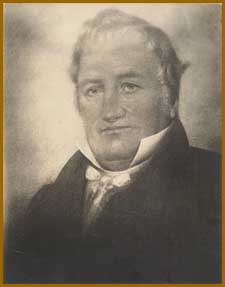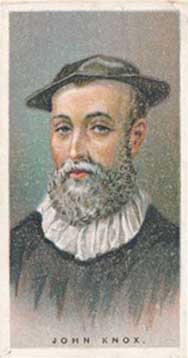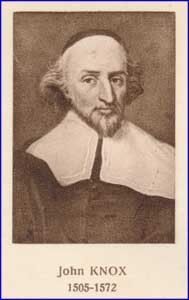O, That All Men Would Humble Themselves in the Presence of Our God.
As you prepare your hearts for Lord’s Day worship, This seems an appropriate item to read. Tthe following sermon by John Knox is one of the few committed to writing by him. His text is Isaiah 26:13-21. The historical setting of the sermon is explained in this preface:
 “Henry Darnley (king of Scotland by his marriage with queen Mary,) went sometimes to mass with the queen, and sometimes attended the protestant sermons. To silence the rumours then circulated of his having forsaken the reformed religion, he, on the 19th of August, 1565, attended service at St. Giles’s church, sitting on a throne which had been prepared for him. Knox preached that day on Isaiah xxvi.13, 14, and happened to prolong the service beyond the usual time. In one part of the sermon, he quoted these words of scripture, ‘I will give children to be their princes, and babes shall rule over them: children are their oppressors, and women rule over them.’ In another part he referred to God’s displeasure against Ahab, because he did not correct his idolatrous wife Jezebel. No particular application of these passages was made by Knox, but the king considered them as reflecting upon the queen and himself, and returned to the palace in great wrath. He refused to dine, and went out to hawking.
“Henry Darnley (king of Scotland by his marriage with queen Mary,) went sometimes to mass with the queen, and sometimes attended the protestant sermons. To silence the rumours then circulated of his having forsaken the reformed religion, he, on the 19th of August, 1565, attended service at St. Giles’s church, sitting on a throne which had been prepared for him. Knox preached that day on Isaiah xxvi.13, 14, and happened to prolong the service beyond the usual time. In one part of the sermon, he quoted these words of scripture, ‘I will give children to be their princes, and babes shall rule over them: children are their oppressors, and women rule over them.’ In another part he referred to God’s displeasure against Ahab, because he did not correct his idolatrous wife Jezebel. No particular application of these passages was made by Knox, but the king considered them as reflecting upon the queen and himself, and returned to the palace in great wrath. He refused to dine, and went out to hawking.
That same afternoon Knox was summoned from his bed to appear before the council. He went accompanied by several respectable inhabitants of the city. The secretary informed him of the king’s displeasure at his sermon, and desired that he would abstain from preaching for fifteen or twenty days. Knox answered, that he had spoken nothing but according to his text, and if the church would command him either to preach or abstain, he would obey so far as the word of God would permit him. The king and queen left Edinburgh during the week following, and it does not appear that Knox was actually suspended from preaching.”
The following are Knox’s reasons for the publication of this Sermon, extracted from his preface to the first edition.
“If any will ask, To what purpose this sermon is set forth? I answer, To let such as satan has not altogether blinded, see upon how small occasions great offence is now conceived. This sermon is it, for which, from my bed, I was called before the council; and after long reasoning, I was by some forbidden to preach in Edinburgh, so long as the king and queen were in town. This sermon is it, that so offends such as would please the court, and will not appear to be enemies to the truth; yet they dare affirm, that I exceeded the bounds of God’s messenger. I have therefore faithfully committed unto writing whatsoever I could remember might have been offensive in that sermon; to the end, that the enemies of God’s truth, as well as the professors of the same, may either note unto me wherein I have offended, or at the least cease to condemn me before they have convinced me by God’s manifest word.”
A SERMON ON ISAIAH XXVI.
Isaiah 26:13-16, etc. — O Lord our God, other lords besides thee have had dominion over us; but by thee only will we make mention of thy name. They are dead, they shall not live; they are deceased, they shall not rise; therefore hast thou visited and destroyed them, and made all their memory to perish. Thou hast increased the nation, O Lord, thou hast increased the nation, thou art glorified; thou hast removed it far unto the ends of the earth. Lord, in trouble have they visited thee, they poured out a prayer when thy chastening was upon them, &c.
As the skilful mariner (being master,) having his ship tossed with a vehement tempest, and contrary winds, is compelled oft to traverse, lest that, either by too much resisting to the violence of the waves, his vessel might be overwhelmed; or by too much liberty granted, might be carried whither the fury of the tempest would, so that his ship should be driven upon the shore, and make shipwreck; even so doth our prophet Isaiah in this text, which now you have heard read. For he, foreseeing the great desolation that was decreed in the council of the Eternal, against Jerusalem and Judah, namely, that the whole people, that bare the name of God, should be dispersed; that the holy city should be destroyed; the temple wherein was the ark of the covenant, and where God had promised to give his own presence, should be burnt with fire; and the king taken, his sons in his own presence murdered, his own eyes immediately after be put out; the nobility, some cruelly murdered, some shamefully led away captives; and finally, the whole seed of Abraham rased, as it were, from the fate of the earth. The prophet, I say, fearing these horrible calamities, doth, as it were, sometimes suffer himself, and the people committed to his charge, to be carried away with the violence of the tempest, without further resistance than by pouring forth his and their dolorous complaints before the majesty of God, as in the 13th, 17th, and 18th verses of this present text we may read. At other times he valiantly resists the desperate tempest, and pronounces the fearful destruction of all such as trouble the church of God; which he pronounces that God will multiply, even when it appears utterly to be exterminated. But because there is no final rest to the whole body till the Head return to judgment, he exhorts the afflicted to patience, and promises a visitation whereby the wickedness of the wicked shall be disclosed, and finally recompensed in their own bosoms.
These are the chief points of which, by the grace of God, we intend more largely at this present to speak;
First, The prophet saith, “O Lord our God, other lords besides thee have ruled us.”
This, no doubt, is the beginning of the dolorous complaint, in which he complains of the unjust tyranny that the poor afflicted Israelites sustained during the time of their captivity. True it is, that the prophet was gathered to his fathers in peace, before this came upon the people: for a hundred years after his decease the people were not led away captive; yet he, foreseeing the assurance of the calamity, did before-hand indite and dictate unto them the complaint, which afterward they should make. But at the first sight it appears, that the complaint has but small weight; for what new thing was it, that other lords than God in his own person ruled them, seeing that such had been their government from the beginning? For who knows not, that Moses, Aaron, and Joshua, the judges, Samuel, David, and other godly rulers, were men, and not God; and so other lords than God ruled them in their greatest prosperity.
For the better understanding of this complaint, and of the mind of the prophet, we must, first, observe from whence all authority flows; and, secondly, to what end powers are appointed by God: which two points being discussed, we shall better understand, what lords and what authority rule beside God, and who they are in whom God and his merciful presence rules.
The first is resolved to us by the words of the apostle, saying, “There is no power but of God.” David brings in the eternal God speaking to judges and rulers, saying, “I have said, ye are gods, and sons of the Most High.” (Psal. lxxxii.) And Solomon, in the person of God, affirmeth the same, saying, “By me kings reign, and princes discern the things that are just.” From which place it is evident, that it is neither birth, influence of stars, election of people, force of arms, nor finally, whatsoever can be comprehended under the power of nature, that makes the distinction betwixt the superior power and the inferior, or that establishes the royal throne of kings; but it is the only and perfect ordinance of God, who willeth his terror, power, and majesty, partly to shine in the thrones of kings, and in the faces of judges, and that for the profit and comfort of man. So that whosoever would study to deface the order of government that God has established, and allowed by his holy word, and bring in such a confusion, that no difference should be betwixt the upper powers and the subjects, does nothing but avert and turn upside down the very throne of God, which he wills to be fixed here upon earth; as in the end and cause of this ordinance more plainly shall appear: which is the second point we have to observe, for the better understanding of the prophet’s words and mind.
The end and cause then, why God imprints in the weak and feeble flesh of man this image of his own power and majesty, is not to puff up flesh in opinion of itself; neither yet that the heart of him, that is exalted above others, should be lifted up by presumption and pride, and so despise others; but that he should consider he is appointed lieutenant to One, whose eyes continually watch upon him, to see and examine how he behaves himself in his office. St. Paul, in few words, declares the end wherefore the sword is committed to the powers, saying, “It is to the punishment of the wicked doers, and unto the praise of such as do well.” Rom. xiii.
Of which words it is evident, that the sword of God is not committed to the hand of man, to use as it pleases him, but only to punish vice and maintain virtue, that men may live in such society as is acceptable before God. And this is the true and only cause why God has appointed powers in this earth.
For such is the furious rage of man’s corrupt nature, that, unless severe punishment were appointed and put in execution upon malefactors, better it were that man should live among brutes and wild beasts than among men. But at this present I dare not enter into the description of this common-place; for so should I not satisfy the text, which by God’s grace I purpose to explain. This only by the way — I would that such as are placed in authority should consider, whether they reign and rule by God, so that God rules them; or if they rule without, besides, and against God, of whom our prophet hero complains.
If any desire to take trial of this point, it is not hard; for Moses, in the election of judges, and of a king, describes not only what persons shall be chosen to that honour, but also gives to him that is elected and chosen, the rule by which he shall try himself, whether God reign in him or not, saying, “When he shall sit upon the throne of his kingdom, he shall write to himself an exemplar of this law, in a book by the priests and Levites; it shall be with him, and he shall lead therein, all the days of his life: that he may learn to fear the Lord his God, and to keep all the words of his law, and these statutes, that he may do them; that his heart be not lifted up above his brethren, and that he turn not from the commandment, to the right hand, or to the left.” Deut. xvii.
The same is repeated to Joshua, in his inauguration to the government of the people, by God himself, saying, “Let not the book of this law depart from thy mouth, but meditate in it day and night, that thou mayest keep it, and do according to all that which is written in it. For then shall thy way be prosperous, and thou shall do prudently.” Josh. i.
The first thing then that God requires of him, who is called to the honour of a king, is, The knowledge of his will revealed in his word.
The second is, An upright and willing mind, to put in execution such things as God commands in his law, without declining to the right, or to the left hand.
Kings then have not an absolute power, to do in their government what pleases them, but their power is limited by God’s word; so that if they strike where God has not commanded, they are but murderers; and if they spare where God has commanded to strike, they and their throne are criminal and guilty of the wickedness which abounds upon the face of the earth, for lack of punishment.
O that kings and princes would consider what account shall be craved of them, as well of their ignorance and misknowledge of God’s will, as for the neglecting of their office! But now, to return to the words of the prophet. In the person of the whole people he complains unto God, that the Babylonians (whom he calls, “other lords besides God,” both because of their ignorance of God, and by reason of their cruelty and inhumanity,) had long ruled over them in great rigour, without pity or compassion upon the ancient men, and famous matrons: for they, being mortal enemies to the people of God, sought by all means to aggravate their yoke, yea, utterly to exterminate the memory of them, and of their religion, from the face of the earth. Read the rest of this entry »





